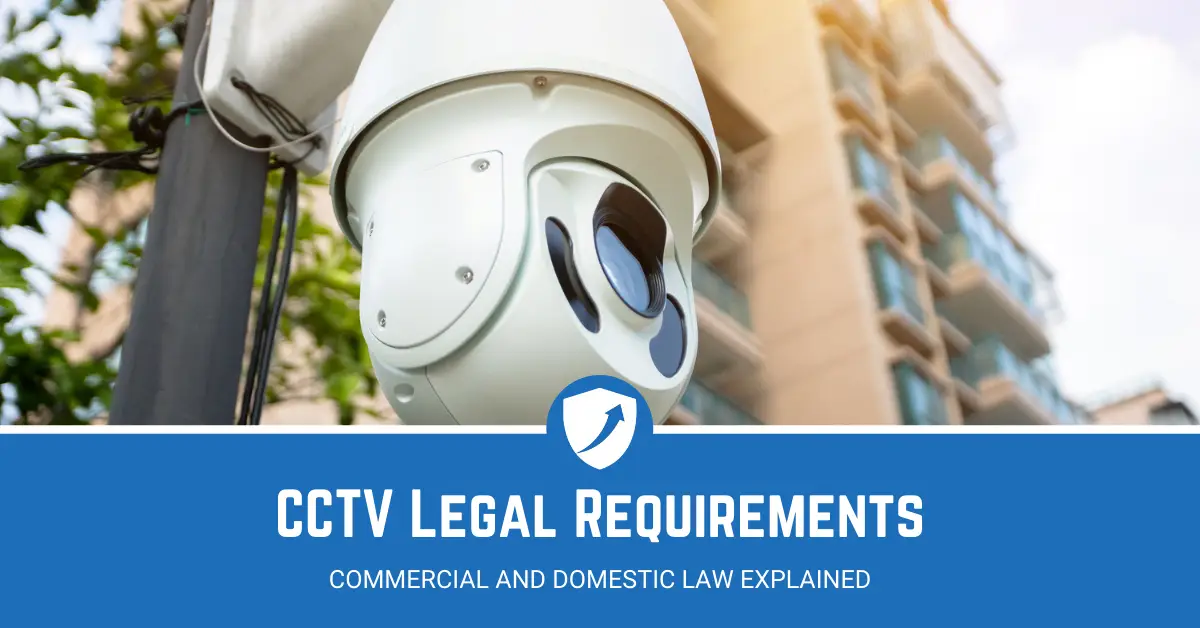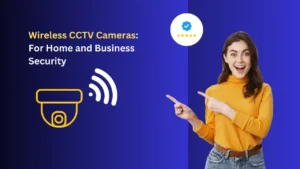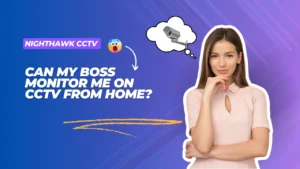The UK’s streets, homes, and workplaces are monitored by more than 5.2 million CCTV cameras. This means one camera watches every 13 people in the country.
CCTV systems protect properties and ensure workplace safety effectively. Business owners and homeowners should think about CCTV laws UK, because these rules play a vital part in balancing security needs with privacy rights and legal requirements.
This piece covers everything from home CCTV regulations to workplace policies. You’ll learn about data protection rules and ways to handle neighbor concerns. The information helps you install and operate CCTV systems within UK law. Property owners and businesses can make informed decisions about camera installations and maintain proper surveillance practices.
UK CCTV Legal Framework For General Public Like Us
UK CCTV systems must comply with three main frameworks that balance privacy rights with legitimate surveillance needs. Let’s examine how these laws shape our CCTV system usage.
General Data Protection Regulation (GDPR)
GDPR classifies CCTV footage as personal data. Our camera operations must follow these essential principles:
- Lawful, fair, and transparent processing
- Purpose limitation (only using footage for stated purposes)
- Data minimization (recording only what’s needed)
- Storage limitation with regular deletion schedules
- Maintaining data security and integrity
Data Protection Act 2018
The DPA 2018 functions among other GDPR regulations as our national data protection law. This act grants us specific rights about CCTV footage. We can access recordings of ourselves and learn camera locations. Home CCTV users should ensure their systems respect their neighbors’ privacy.
Protection of Freedoms Act 2012
Additional safeguards come from this legislation for public space surveillance. The Surveillance Camera Code of Practice applies to cameras that capture public areas. The code highlights:
Responsible and proportionate surveillance system usage remains a legal requirement. A CCTV installation at home or work needs careful evaluation of its necessity. The system should respect everyone’s privacy rights. Regular compliance reviews with these frameworks help us operate legally while protecting both security and privacy interests.
Home CCTV Legal Requirements (Installation And Uses)
UK regulations require specific legal compliance for home CCTV systems.
Here’s what you need to know about proper CCTV installation and usage.
Property boundary considerations
Camera placement needs careful attention. Your cameras should capture images within your property boundaries. Your system might record areas beyond your property—like neighboring gardens or public footpaths. This means you’ll need to follow data protection laws. Privacy filters or adjusted camera angles help minimize footage capture beyond your property line.
Privacy impact assessments
A full picture of privacy implications should happen before CCTV installation.
This process has sections on:
- Each camera location’s necessity
- Types of captured images and audio
- Potential risks to others’ privacy
- Security measure implementation
- System review schedules
Neighbor notification requirements
Specific obligations apply if your CCTV system records beyond your property boundaries. These requirements include:
Your neighbors need information about the CCTV installation and its purpose. Tell them what your cameras will record (images, audio, or both) and how you’ll protect their privacy. Clear signs should show that CCTV is active.
Secure storage of recorded footage falls under your responsibility. Only authorized people should access the recordings. You must delete footage regularly and handle access requests properly from people captured by your cameras.
Business CCTV Compliance Guidelines
CCTV operations in our business must comply with specific guidelines. Let’s look at what we need to do to keep our surveillance systems legal and compliant.
Registration and licensing
Business operators must register with the Information Commissioner’s Office (ICO) and pay an annual data protection fee. SMEs pay between £40 to £60, with direct debit payments offering a discount. The first step in CCTV installation should be registration since hefty fines apply if you don’t.
Employee rights and consultation
Our CCTV system in the workplace comes with specific obligations to our employees. Here’s what we need to do:
- Tell staff where cameras are and why we use them
- Get employee input before installing CCTV
- Give clear notice about footage used for monitoring
- Address any staff concerns about surveillance
- Respect everyone’s right to access footage
You can use CCTV for security reasons, but monitoring staff performance without notice isn’t fair and might break the law. The only exception is covert monitoring during specific investigations of suspected illegal activities.
Customer notification requirements
Our CCTV usage must stay transparent to customers and visitors. Signs should clearly show:
- That CCTV is in use
- Why we use CCTV
- Who to contact with questions
- The system controller’s details
The footage needs secure storage with access limited to authorized staff. We must respond within one calendar month to people who request their footage, and usually can’t charge for this service.
Data Protection and Storage Requirements
CCTV footage management needs careful attention to protect and store data properly. You must follow specific guidelines to keep recorded information secure and available only to authorized people.
Retention periods and policies
CCTV footage should not be kept longer than 31 days unless specific circumstances demand it. Clear policies must be set up for:
- Standard retention (30-31 days)
- Extended retention for ongoing investigations
- Special cases requiring longer storage (like legal proceedings)
- Automatic deletion procedures
Security measures for footage
Your responsibility includes implementing reliable security measures to protect CCTV recordings. The system needs secure storage solutions, whether cloud-based or local, with strict access controls. System backups should happen regularly to preserve important footage and maintain data integrity.
Access request procedures
People’s requests to access footage with their personal data need a response within one calendar month. The access request process should be clear and transparent. You can invite people to view footage if copies cannot be provided, especially when recordings show other individuals.
Footage preservation beyond standard periods needs proper documentation, especially for law enforcement or legal matters. Legal proceedings have different timeframes: three years and four months for personal injuries, and six years for serious incidents.
The Information Commissioner’s Office (ICO) requires lawful, transparent, and justifiable handling of all footage. Your retention periods need regular reviews to ensure they match your CCTV operation’s stated purpose.
Penalties and Enforcement Actions
You need to learn about what happens if you don’t follow CCTV regulations. The Information Commissioner’s Office (ICO) has strong powers to enforce these laws. These penalties can affect both homeowners and businesses.
ICO enforcement powers
The ICO can take several actions against anyone who breaks CCTV regulations:
- Issue warnings and reprimands
- Impose temporary or permanent bans on data processing
- Order the correction or deletion of footage
- Require immediate changes to surveillance practices
- Conduct mandatory inspections
Financial penalties
A two-tier system of financial penalties exists for CCTV-related violations. The higher level penalties can reach £17.5 million or 4% of annual global turnover, whichever is greater. These apply to basic breaches like violating data processing principles or individual’s rights. The lower level penalties, capped at £8.7 million or 2% of turnover, deal with administrative violations.
Legal proceedings and appeals
Recent cases show how strictly these rules are enforced. A business got a £120,000 fine because they used CCTV footage wrongly in workplace disciplinary proceedings. The courts found this violated the purpose limitation principle since the footage went beyond its security purpose.
You have the right to appeal enforcement actions. The process needs careful documentation and legal representation. The ICO looks at several factors before setting penalties. These include the type, seriousness, and length of the violation, plus any steps taken to reduce damage to individual’s rights.
The fines go to HM Treasury’s Consolidated Fund and support public services like healthcare and education. This shows why following CCTV regulations properly from the start matters so much.
Installing CCTV to comply with Home CCTV Law
A compliant CCTV system needs careful attention to detail and a good understanding of legal obligations. The Information Commissioner’s Office (ICO) has clear guidelines we need to follow for camera installations on our properties.
Our CCTV system should capture images only within our property boundaries. We must comply with data protection laws if our cameras record beyond our property line. This means we need to inform our neighbors and put up clear signs about our CCTV operation.
A compliant system needs these important steps:
- Cameras should face away from neighboring properties
- Clear, visible signs should show CCTV operation
- The system must record quality footage for its purpose
- Recorded footage needs secure storage
- A regular deletion schedule must be in place
Access to footage should be strictly controlled and stored safely. People have the right to ask for deletion of their images if we capture them outside our property boundary. We need to respond to these requests within one month, unless we delete recordings regularly.
The ICO can enforce penalties if we don’t meet these requirements. Being careful with these guidelines helps avoid problems with the ICO and neighbors. A good CCTV system protects property while respecting everyone’s privacy rights.
What is the law on having CCTV in your home?
Strict regulations apply to homeowners with CCTV systems that capture images beyond their private property. The Information Commissioner’s Office (ICO) enforces these requirements through the General Data Protection Regulation (GDPR) and Data Protection Act 2018.
Our cameras might record areas beyond our property boundary—including neighbors’ homes, gardens, shared spaces, or public areas. This recording activity requires us to comply with data protection laws. We have several legal responsibilities:
- Installing cameras that capture only necessary footage
- Securing all recorded information appropriately
- Using footage solely for property protection
- Responding to access requests from recorded individuals
- Displaying clear signage about CCTV operation
- Deleting footage regularly or automatically
The best practice is to position cameras that focus on our property where possible. If capturing neighboring areas can’t be avoided, we must inform affected parties about our CCTV system.
The ICO offers detailed guidance for domestic CCTV use and provides a checklist to help us meet our obligations. The Surveillance Camera Commissioner (SCC) doesn’t directly regulate home CCTV systems, but following their code of practice voluntarily is recommended.
Failing to meet these requirements could lead to ICO enforcement actions and possible legal action from affected individuals. These regulations specifically apply to systems capturing beyond our property. Data protection laws don’t apply if cameras only record within our private domestic boundary.
Note that we are responsible for all information our system records. The footage must be used only to protect our property. This responsibility includes maintaining proper security measures and quickly responding to any subject access requests.
What is the law on CCTV in the home?
Let’s learn about our rights with home CCTV systems to handle disputes and privacy issues better. Here’s what you need to know about dealing with CCTV-related problems.
What rights do I have?
Data protection laws give us several key rights when someone’s CCTV records our image. You can ask for copies of footage through a subject access request. The law also lets you request footage deletion in specific cases and object to being recorded. CCTV operators must respond within one calendar month. They should also tell you why they’re recording.
What will the ICO do if I make a complaint?
The Information Commissioner’s Office sends warning letters to CCTV owners who break the rules. They don’t often take action against home users unless something serious happens. Their job focuses more on helping people follow the rules than punishing them.
What if someone is using CCTV in a communal area?
Shared spaces need strict compliance with data protection rules. Your first step should be reaching out to the property manager or landlord about any unauthorized cameras. Properly installed systems need clear signs that show CCTV is running and list the system manager’s details.
What if I feel harassed?
Document your concerns if CCTV monitoring makes you uncomfortable. CCTV use by itself rarely counts as harassment. Combined with other actions, it might break the Protection from Harassment Act 1997. Serious issues should go to local police or housing authorities.
What should I do if I have a neighbor dispute?
Start with a calm chat to resolve CCTV disputes with neighbors. If that doesn’t work, you have options:
- Try professional mediation services
- Talk to their landlord if they’re renting
- Get legal advice as your last option
Note that courts want to see that you tried reasonable ways to fix things before taking legal action.
What should I do if I am concerned about a CCTV camera or I’m unhappy about being recorded?
A neighbor’s CCTV camera recording our private space needs a step-by-step solution that works. We need to check if their camera actually records beyond their property and captures our garden, windows, or private areas.
The best approach starts with these simple steps before filing any formal complaints:
- Talk politely with the CCTV owner
- Ask why they installed the cameras
- See what the cameras actually record
- Suggest adjusting camera angles
- Ask about privacy filters or blocking technology
Direct communication might not solve everything. A neutral third party can help mediate the situation and keep good relations with neighbors while solving privacy concerns.
The Information Commissioner’s Office (ICO) at 0303 123 1113 can help if friendly approaches don’t work. They offer an online tool that shows the best way forward. It’s worth mentioning that the ICO doesn’t usually take action against home CCTV users unless the case is exceptional.
CCTV owners must follow data protection laws if their cameras record beyond their property. They need proper signs, secure storage, and regular deletion of footage. We can bring up these requirements in our talks with the owner or the ICO if we think they’re not being followed.
Conclusion
CCTV systems protect our properties and ensure security. These systems have become essential tools in our security arsenal. The benefits must be carefully balanced against legal compliance requirements and individual privacy rights.
British regulations give homeowners and businesses clear guidelines about CCTV usage that emphasize data protection, correct installation, and privacy respect.
CCTV operators need to do more than just install cameras. A full picture of privacy impact needs to be conducted. The footage must be stored securely and access requests should be handled appropriately. Camera systems should only capture relevant areas. The setup should be reviewed regularly to comply with current laws while safeguarding both security interests and privacy rights.
Compliance with these regulations shields us from penalties. It also helps maintain positive relationships with neighbors and stakeholders.
The key to success lies in finding the sweet spot between security requirements and privacy obligations, regardless of where the CCTV operates. A properly implemented and managed CCTV system allows effective surveillance while respecting everyone’s rights.



